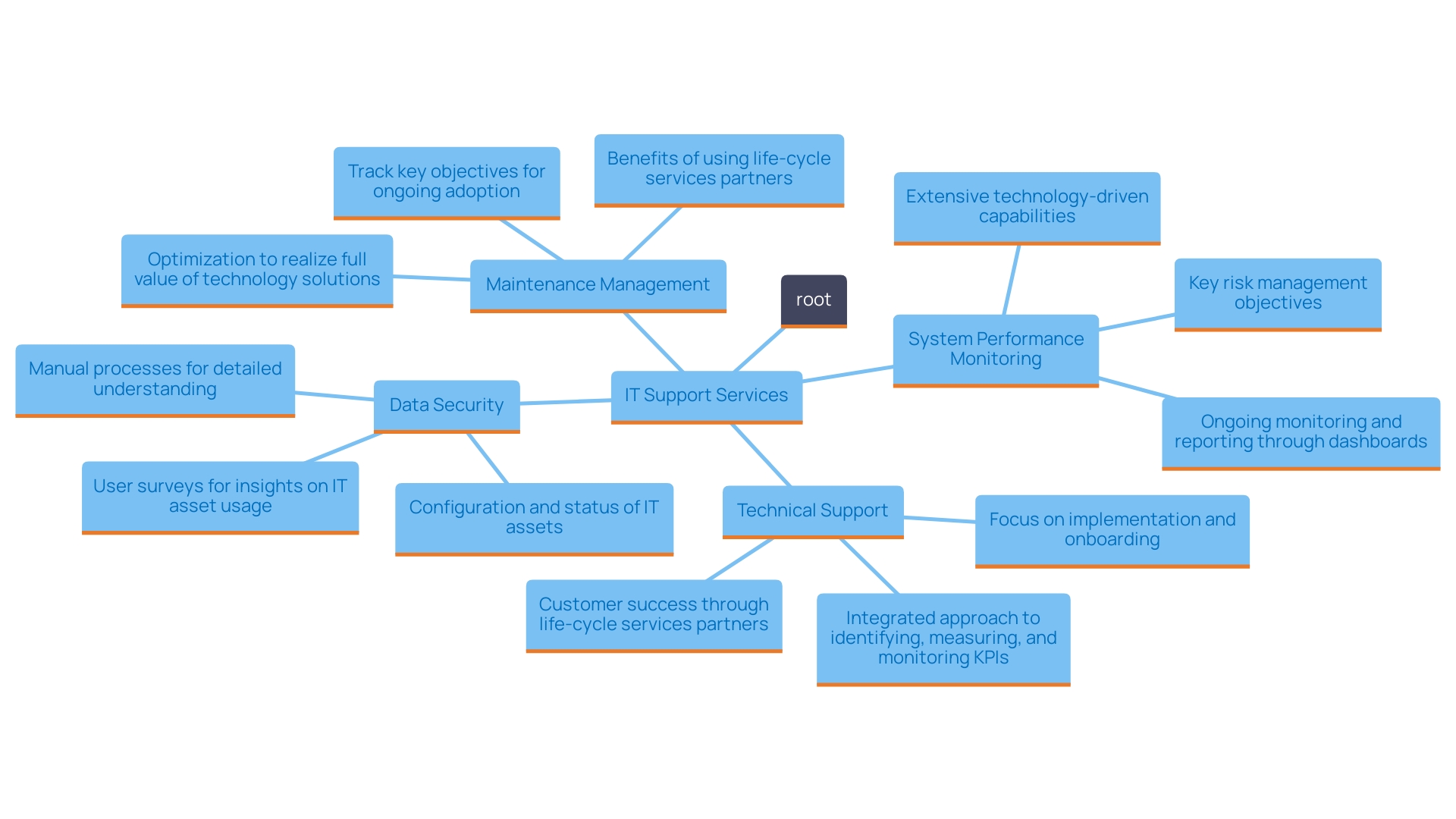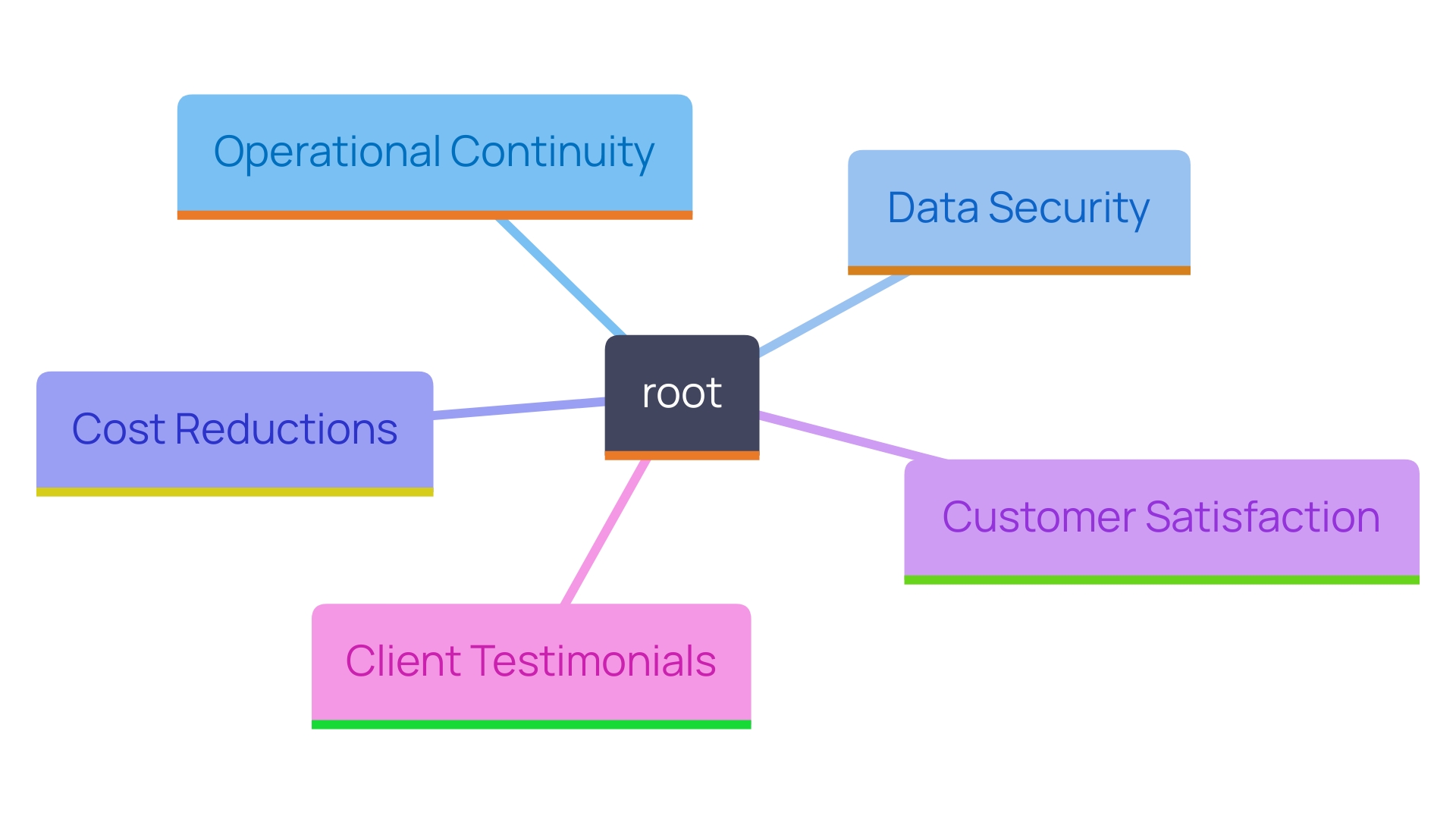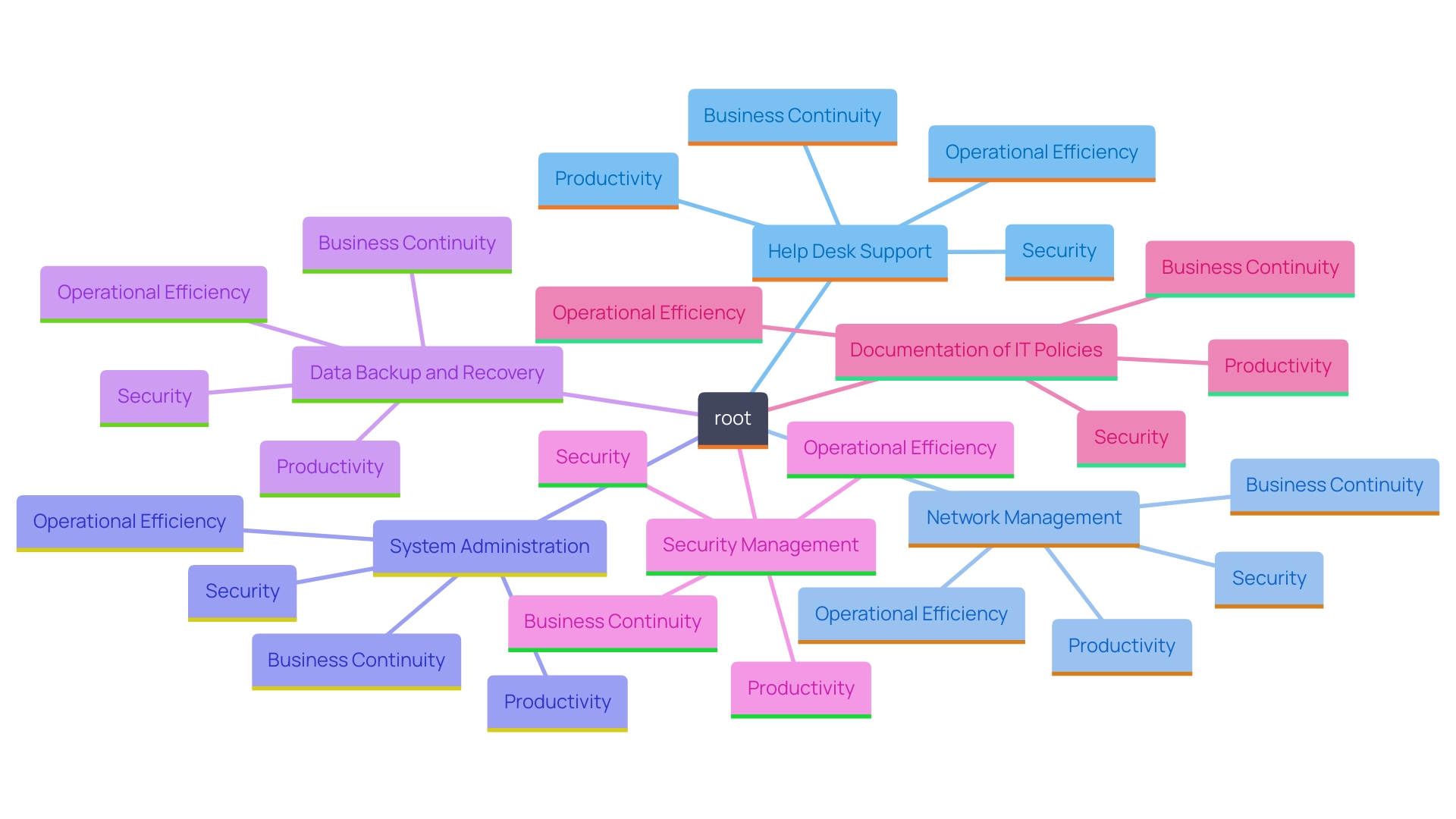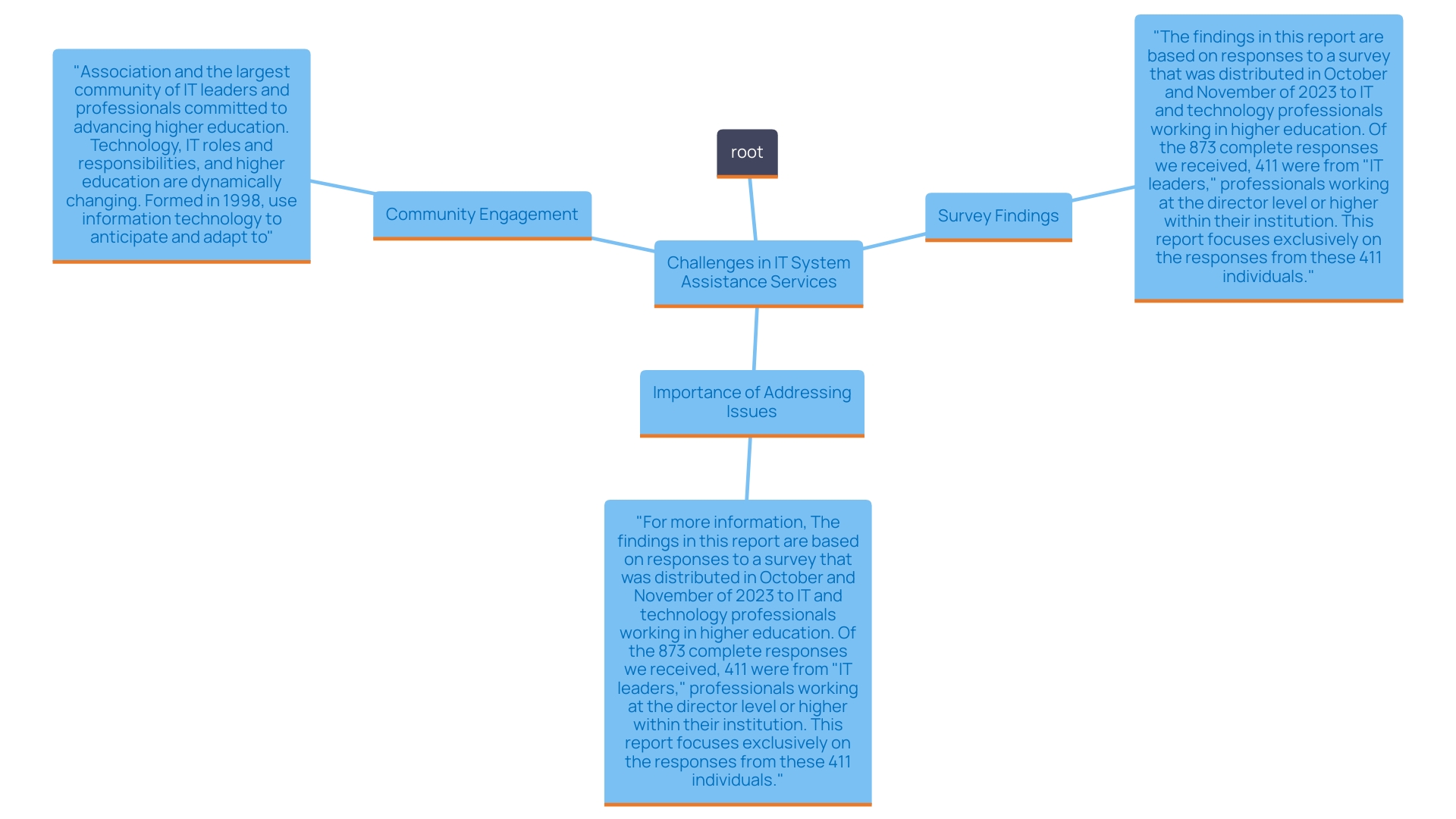Introduction
In the digital age, where technology serves as the backbone of organizational success, the significance of IT infrastructure support services has never been more pronounced. These services encompass a comprehensive array of activities aimed at ensuring that an organization's technological framework operates seamlessly. From monitoring system performance to implementing robust security measures, effective IT infrastructure support is crucial for minimizing downtime, enhancing productivity, and safeguarding sensitive data.
As businesses navigate an increasingly competitive landscape, understanding the vital components and benefits of these services becomes essential for leveraging technology to its fullest potential. However, the journey is not without its challenges, as organizations must contend with budget constraints, rapid technological advancements, and the need for strategic alignment. This article delves into the complexities of IT infrastructure support services, exploring their importance, key components, and the obstacles organizations face in optimizing their technology environments.
Understanding IT Infrastructure Support Services
IT Support Services include a variety of activities and solutions aimed at ensuring that a company's IT framework functions seamlessly and effectively. This includes the management of hardware, software, networks, and data storage systems. The main elements of IT framework assistance consist of:
- Monitoring system performance
- Offering technical help
- Ensuring data security
- Managing upgrades and maintenance
These offerings are essential as they assist entities in mitigating risks, decreasing downtime, and improving overall productivity by sustaining the health of their technology environments.

The Importance and Benefits of IT Infrastructure Support
The significance of IT infrastructure support systems cannot be overstated. They provide several key benefits that are essential for any organization aiming to thrive in a competitive landscape.
- Firstly, these offerings ensure operational continuity by minimizing system failures and downtime.
- Secondly, they enhance data security by implementing protective measures against cyber threats.
- Thirdly, effective IT systems assistance can result in considerable cost reductions by enhancing resource use and minimizing the necessity for large internal IT teams.
Our clients have shared their experiences, highlighting our effectiveness:
- "I was really impressed with the way STS Consulting Group handled everything. From the initial conversation through the entire process, they were very helpful and knowledgeable."
- Another client remarked, "STS Consulting Group was the missing piece to my puzzle. They addressed every challenge and guided us to achieve our goals with utmost professionalism."
Lastly, these offerings can improve customer satisfaction by ensuring that technology-related issues are resolved promptly, thus enhancing the overall user experience. In summary, investing in IT systems assistance is a strategic decision that allows organizations to utilize technology effectively and uphold a competitive advantage.

Key Components of IT Infrastructure Support Services
A strong IT framework is sustained by various crucial assistance systems, each vital to keeping business operations running smoothly. One of the cornerstone offerings is Help Desk Support, which acts as the primary point of contact for technical issues, ensuring that problems are resolved swiftly and effectively. The role of help desk support is vital in reducing downtime and sustaining productivity, contributing to measurable enhancements in delivery and operational efficiency.
Network Management is another vital component, focusing on the continuous monitoring and maintenance of the network infrastructure to guarantee seamless connectivity and optimal performance. Efficient network management prevents potential disruptions and ensures that all communication channels operate without interruption, thereby enhancing overall reliability and user satisfaction.
System Administration oversees the servers, databases, and applications, ensuring they operate at peak performance. Proper system administration is essential for the smooth functioning of IT systems, as it involves regular updates, patch management, and performance monitoring that directly influence system uptime and responsiveness.
Data Backup and Recovery strategies are implemented to protect critical data from loss and ensure business continuity. These strategies include regular backups, disaster recovery planning, and testing to ensure that data can be restored quickly in the event of a failure, thus minimizing the impact of data loss on business operations.
Security Management is paramount in safeguarding IT assets against threats. This involves deploying firewalls, antivirus software, and other protective measures to create a secure environment. As Aakash Tiwari aptly puts it, 'Following best practices such as investing in scalable solutions, implementing strong security measures, and planning for flexibility can help businesses stay competitive and resilient in today’s dynamic market.' Security management directly correlates with reducing the likelihood of breaches, which can have significant financial and reputational consequences.
Proper documentation of IT policies and procedures plays a crucial role in ensuring consistency and security throughout the entity. A case study on documenting IT policies highlights how this practice reduces human error and enhances overall security by ensuring all employees adhere to the same protocols. For instance, a company that implemented thorough documentation observed a 30% decrease in security incidents, demonstrating the effectiveness of this approach.
Integrating these essential elements into IT framework assistance establishes a robust and secure base that facilitates business activities and adjusts to changing technological requirements, ultimately resulting in enhanced performance and strategic benefit.

Challenges in IT Infrastructure Support
Although IT system assistance services are crucial, organizations frequently encounter various difficulties. These can include:
- Budget constraints, which limit the ability to invest in necessary tools and personnel.
- The rapid pace of technological change, which can make it difficult for assistance teams to keep up with the latest advancements and best practices.
- The challenge of aligning IT systems assistance with overall business strategy, which requires effective communication and collaboration across departments.
- Resistance to change within the entity, which can hinder the successful implementation of new systems or processes.
By recognizing and addressing these challenges, organizations can better position themselves to take full advantage of the benefits that IT infrastructure support services offer.

Conclusion
The significance of IT infrastructure support services in today's digital landscape cannot be overstated. These services are foundational to the smooth operation of an organization's technology environment, encompassing essential activities such as system monitoring, data security, and technical support. By investing in these services, organizations can minimize downtime, enhance productivity, and safeguard sensitive information, ultimately driving operational continuity and customer satisfaction.
Furthermore, the key components of IT infrastructure support, including help desk support, network management, and security management, play a critical role in maintaining the efficiency and reliability of business operations. However, organizations must also navigate various challenges, such as budget constraints and the rapid pace of technological advancements. A proactive approach to these challenges, combined with a strategic alignment of IT support with business goals, empowers organizations to leverage technology effectively and maintain a competitive edge.
In conclusion, the value of robust IT infrastructure support services extends far beyond mere technical assistance. It is a strategic investment that not only enhances operational efficiency but also positions organizations to thrive in an ever-evolving technological landscape. By recognizing the importance of these services and addressing the associated challenges, businesses can unlock the full potential of their technology environments, ensuring long-term success and resilience in a competitive market.




